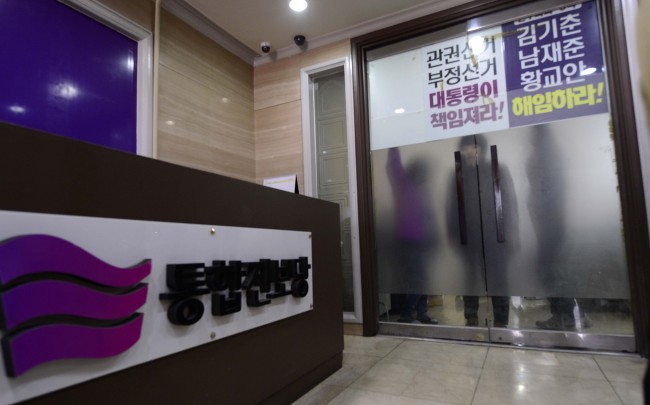 |
The main office of the Unified Progressive Party. (Park Hae-mook/The Korea Herald) |
The oft-troubled Unified Progressive Party is facing its biggest crisis yet as the government moves to have the left-wing party disbanded, citing its links to North Korea.
The unprecedented decision came in the wake of an investigation into UPP lawmaker Lee Seok-ki and other senior officials indicted on charges of plotting an armed revolt.
The UPP represents the more radical end of Korea’s progressive bloc. As such its former and current members have resorted to extreme actions within the parliament to further the party’s cause.
Former lawmaker Kang Ki-kap has been tried for violence while Rep. Kim Sun-dong is on trial for using a tear gas canister to prevent the Korea-U.S. Free Trade Agreement from being ratified in 2011.
The party has its roots in the Democratic Labor Party launched in 2000 under the backing of labor unions. Korea’s first progressive party in 40 years stormed the political scene with the unexpected popularity of its presidential candidate in 2002, which helped it win 10 parliamentary seats in 2004.
The labor party, originally a coalition of a wide range of leftist groups, has been reduced to a tiny group led by politicians accused of upholding a pro-North Korean ideology.
The party has already experienced a number of internal crises that threatened its existence.
Less than a year after it was founded in November 2011, when the Democratic Labor Party merged with other progressive factions, the party became embroiled in allegations of rigging the primaries for proportional representative nominations ahead of last year’s general elections.
The allegations became central to factional infighting, which culminated in the party’s top officials being assaulted by members of a hard-line faction. As a result, some of its most influential figures, including Reps. Sim Sang-jeung, Roh Hoe-chan and Rhyu Si-min broke away to set up the Progressive Justice Party.
The impact the UPP has had on the political arena, however, has not been limited to the antics of its lawmakers and supporters.
Although the party holds only six seats in the 300-seat National Assembly, the tiny party has often stolen center stage in the political arena, aided in large part by its sharp-tongued chairwoman Lee Jung-hee.
In the run up to the Dec. 19 election, Lee Jung-hee had a significant impact with her vehement attack on President Park Geun-hye, which is said to have pushed undecided voters away from the progressive bloc.
By Choi He-suk (
cheesuk@heraldcorp.com)








